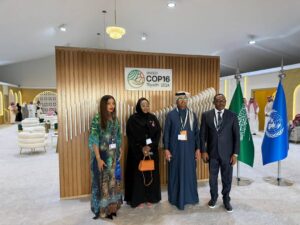
BY AKUDORO GLORIA
The Minister of Women Affairs, Hon Imaan Sulaiman- Ibrahim has said that about 80 percent of women and girls are impacted by climate change, justifying the need for international organisations and development partners to invest in them.
Suleiman-Ibrahim also disclosed that 70 per cent of food production globally is being processed by women, just as 60 per cent of small holder famers are also women, hence an advocacy for women folks to participate in land restoration.
The Minister revealed this at the ongoing United Nations Convention to Combat Desertification (UNCCD) COP16 holding in Riyadh, Saudi Arabia on Thursday, according to the statement by her Media Consultant/Special Adviser on Media, Mr. Jonathan Eze.
She said research also showed that a woman that uses local woods or charcoals in cooking exhales equivalent of 40 sticks of cigarettes per meal, which endangers their lungs and deteriorate their health and life span.
Sulaiman- Ibrahim noted that Nigerian women make up over 50 per cent of the population, while over 70 per cent of agricultural activities are done by them. Thus,
women have the numbers and the willingness to tap into the opportunities provided by the green economy.
According to the Minister, “the challenges of land degradation and desertification extend beyond environmental concerns; they threaten the very fabric of communities, economies, and health, noting that the impact of land degradation is felt acutely across the 6 Geopolitical Zones, creating a terrible cycle of poverty and insecurity.”
Sulaiman Ibrahim referenced the northeast, which is in close proximity to the Lake Chad Basin, inferring that climate change intersects with conflict, forcing millions of people to flee their homes.
While addressing world leaders and delegates, she stated that women and children who constitute 80% of these displaced populations, face heightened risks of sexual and gender-based violence (SGBV), forced and early marriages, disrupting education and worsening poverty.
The Minister emphasized, “expanding desertification continues to undermine agriculture and water resources in the North West, While In the southern regions, particularly in the Niger Delta states, climate change manifests in rising sea levels, coastal erosion, flooding, and biodiversity loss. The Southeast continue to battle devastating effects of gully erosion, which has displaced over thousands of people, destroyed farmlands, and led to significant economic losses.”
The Minister commended President Bola Ahmed Tinubu over the significant strides Nigeria has made in strengthening its regulatory mechanisms including: the signing of the climate change bill into law, the establishment of the National Council on Climate Change (NCCC), and the launch of Nigeria’s Energy Transition Plan.
She added that earlier this year, the NCCC unveiled Nigeria’s NDC Implementation Framework for 2023 – 2030, aimed at mitigating climate change while embracing adaptation and innovation as the cornerstones of its mission.
“A Climate Gender Policy has also been adopted to further strengthen the role of Nigerian women in climate action.
“The State Governments as well as Federal entities such as the North East Development Commission (NEDC) and the Niger Delta Development Commission ,Local and International partners continue to make commendable efforts to address these challenges and mitigate their impact. However, the magnitude of the crisis and the vulnerability of the people affected demands more targeted and innovative action.
“As the Honourable Minister of Women Affairs, I recognize the vital role women play in sustainable development and environmental stewardship. Climate Change is also women’s business.
“Therefore empowering women to participate in Climate Action is a catalyst for innovative solutions and community resilience. I am here to tell you that if we are to win this fight and slow down or reverse some of the effects of climate change, we must provide women with platforms and tools to participate, contribute and drive these solutions that the World urgently needs to meet the relevant sustainable development Goals.”






